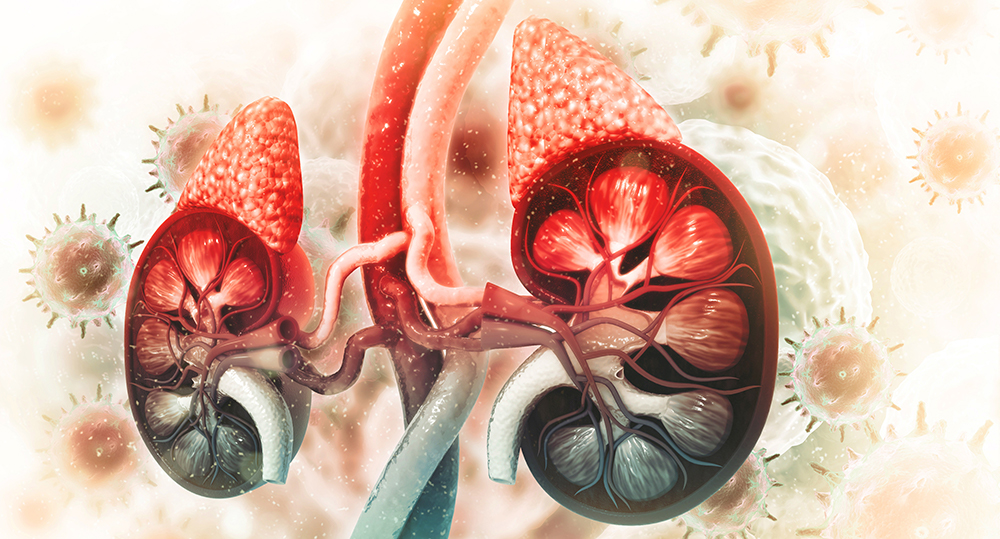Researchers demonstrated the overexpression of the protein APOBEC3B in adrenocortical carcinoma. They also identified the transcription factor, known as GATA3, that directly regulates APOBEC3B.

Adrenocortical carcinoma (ACC) is a rare and aggressive cancer that forms in the outer layer of the adrenal gland tissue above the kidneys. According to the National Institutes of Health, the occurrence of ACC in the United States is believed to only affect one to two people per million, per year. This highly-rare disease also challenges patients and researchers due to its post-diagnosis five-year survival rate of a mere 51%.
At this time, there are no known external factors that cause this disease. Most adrenocortical tumors that have been found produce symptoms including abdominal pain and higher levels of certain hormones, inclusive of cortisol, aldosterone, testosterone, and estrogen. Any of these hormones produced in excess can have numerous troubling effects on the body and, most alarmingly, the cancer cells in the adrenal glands have the potential to travel to other organs.
Researchers—from the National Cancer Institute, Stanford University, Medical College of Wisconsin, Frederick National Laboratory for Cancer Research, and Salubris Biotherapeutics—conducted a study to learn more about ACC and the mechanisms that lead to the biological materialization of this ultra-rare disease. In 2020, their research paper was published by Oncotarget and entitled, “GATA3 and APOBEC3B are prognostic markers in adrenocortical carcinoma and APOBEC3B is directly transcriptionally regulated by GATA3.”
APOBEC3B In ACC
Previously, recent evidence confirmed the overexpression of a protein that is rightfully abbreviated as APOBEC3B (fully known as Apolipoprotein B mRNA editing enzyme catalytic subunit 3B) as a source of mutations occurring in breast, bladder, cervical, lung, head, and neck cancers. In this study the researchers used two publicly available datasets to analyze APOBEC3B gene expression in 21 normal adrenal cortices, 69 benign adrenocortical tumors and 38 ACC samples. They found that APOBEC3B is significantly overexpressed in ACC. The effects of this overexpression, in addition to a tumor mass, were consequently associated with DNA damage, reduced number of cells in S-phase arrest and increased alterations and gene mutations (particularly in the TP53 gene).
To assess the association between APOBEC3B and adrenocortical tumor growth, the team used mouse models to perform a “knockdown” or reduction, in APOBEC3B and measured the effects this had on the tumor tissue. The mice were divided into three groups of eight, and at weeks six and eight of the APOBEC3B knockdown, the researchers found significantly reduced cell proliferation and more cells in S-phase arrest.
GATA3 and APOBEC3B In ACC
The team was able to successfully knockdown APOBEC3B in mice and demonstrated that this caused a significant reduction in tumor volume. They also found in their analysis that tumors with higher expressions of APOBEC3B presented with a higher number of TP53 gene mutations. Given that the researchers were now confident that APOBEC3B is the protein that coincides with the growth of tumors in ACC, they sought to identify the mechanism responsible for regulating this protein.
After a thorough process of tests distinguishing between 90 different cancer-associated transcription factors, the team observed that the transcription factor GATA3 directly binds to the promoter region of APOBEC3B and transcriptionally regulates its gene expression in ACC.
Conclusion
In this study, the team successfully demonstrates that the protein APOBEC3B is overexpressed in ACC and causes DNA damage, alterations and mutations, and also, for the first time, that GATA3 directly regulates the expression of APOBEC3B. This confirms that the higher expression levels of both APOBEC3B and GATA3 are prognostic markers for patients with ACC.
This new information may be used in further research to develop treatments and interventions to improve the prognosis for those affected by adrenocortical carcinoma and other related disorders.
Click here to read the full research paper published by Oncotarget.
Go Behind the Study with co-author, Dr. Monica Varun Tyagi.
Testimonial: Dr. Tyagi describes her experience publishing with Oncotarget.
ONCOTARGET VIDEOS: YouTube | LabTube | Oncotarget.com
—
Oncotarget is a unique platform designed to house scientific studies in a journal format that is available for anyone to read without a paywall making access more difficult. This means information that has the potential to benefit our societies from the inside out can be shared with friends, neighbors, colleagues, and other researchers, far and wide.
For media inquiries, please contact media@impactjournals.com.

